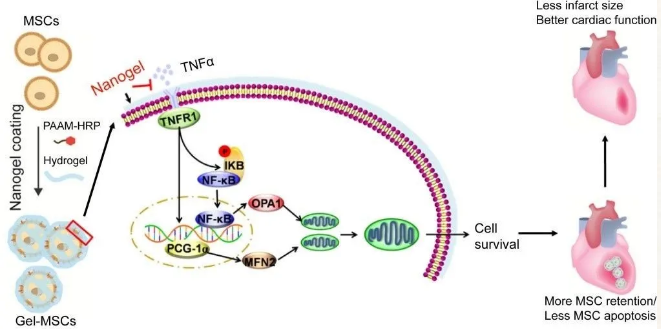

SAHZU and ZJU researchers together develop a nanogel coating that could improve stem cells’ stress resistance and reparative potency in myocardium. The article was published in Advanced Science.
Myocardial infarction is a big threat to human health. Existing medication or interventional therapy, due to their limited function in repairing dead tissues, cannot effectively reverse the progress of heart failure after myocardial infarction. Stem cell-based therapy, on the other hand, provides a new approach to the treatment of heart failure. However, multiple clinical trials suggest that the poor survival and engraftment rates of transplanted stem cells greatly affect the efficacy of the therapy. To tackle this challenge, efforts such as genetic modification of bone marrow mesenchymal stem cells (MSCs) have been made, but are shadowed by concerns about tumorigenicity and immunogenicity. One possible strategy to reduce the risks of the therapy while improving the survival rate of MSCs could be to coat the cells with a shell of biocompatible material.
Prof. HU Xinyang, a SAHZU cardiologist and researcher, and her team therefore introduces a principle of using surface-anchored nanogel to produce robust therapeutic cells by using a polysialic acid-based system to anchor microbial transglutaminase (mTG) to the cell membrane. The system catalyzes the formation of a nanogel coating over the surface of individual MSCs. This biocompatible approach endows therapeutic stem cells with cell vitality, stress resistance, and without altering cellular functions for the first time.
To view the full article, please visit: onlinelibrary.wiley.com/doi/10.1002/advs.202003348
Author:Jing Li | Reviewer:Jing Li | Editor:Jing Li | Source: | Date:2021-02-19 | Views:![]()
![]()
![]()
![]()
88 Jiefang Road,Shangcheng District Hangzhou,China, 310009
1511 Jianghong Road,Binjiang District Hangzhou,China, 310014
300 Yuanju Road, Shangcheng DIstrict, Hangzhou
456 Qidi Road, Xiaoshan District, Hangzhou, China
1 Xihu Avenue, Shangcheng District, Hangzhou
Zijingang Campus of Zhejiang University, 866 Yuhangtang Road, Xihu District, Hangzhou
Please call +86-571-8971 3988 (8am-5pm, Monday through Friday)
Make an appointment online

The Second Affiliated Hospital
Zhejiang University School of Medicine
88 Jiefang Road, Hangzhou, China
+86-571-8731 5108
iao_sahzu@zju.edu.cn
The Needs of Patients and Customers Come First.
The Second Affiliated Hospital Zhejiang University School of Medicine
All Rights Reserved.

